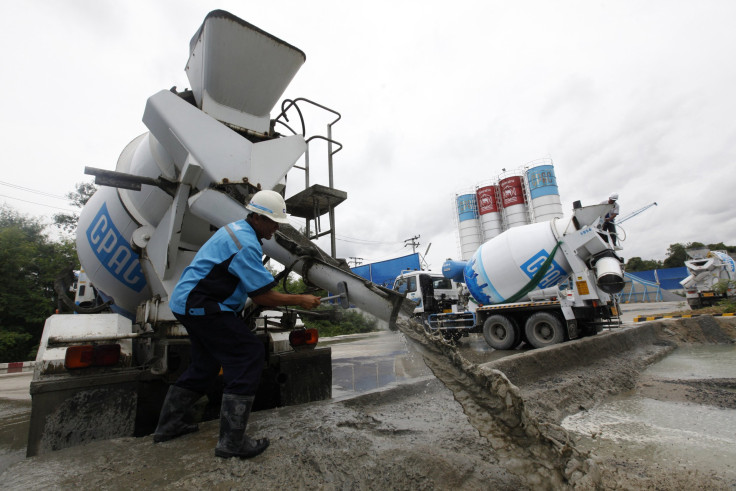Giant Cement Companies Lafarge, Holcim Aim To Merge, Fuelling Antitrust Worries, Fears Of Global Cement Price Increases

A massive project to expand the Panama Canal that has been delayed this year in a high-profile dispute over $1.6 billion in cost overruns -- much of it due to soaring cement prices -- could face yet another hurdle from still higher cement prices if a proposed combination between two of the world's largest cement makers takes place.
The proposed combination of Holcim (HOLN:VX) of Switzerland and France’s Lafarge (LAFP:PA) would form a company that is twice as big as the current third-largest company in the sector, CNBM of China. That prospect is sowing fears of price hikes and setting up what is expected to be a highly complex antitrust review by regulators in India, China, Canada and Brazil.
“This is normally the most attractive time to do it at the start of the upswing, and some of the other global majors may be feeling in a weakened position trying to compete with a combined Lafarge/Holcim,” said Ian Osburn, analyst at Cantor Fitzgerald, in an interview with the Financial Times earlier this week.
Higher-than-expected cement prices have been one of the factors challenging the main contractor on the Panama Canal expansion project. Since 2007, Grupo Unidos por el Canal (GUPC) has been working to double the capacity of the canal by creating a new lane of traffic. But it recently reduced operations by 75 percent and told half of the project’s 10,000 workers to go home amid a high-profile dispute with the government over $1.6 billion in cost overruns from an increase in cement prices.
As the two biggest listed companies in the sector and the fact that both are being investigated for price fixing by the European Union, it’s likely the deal will come under serious investigation from antitrust investigators as it could reduce competition in countries such as Canada, France, Brazil and India. In addition, they control about 30 percent of the U.S. cement market through a network of subsidiary companies that is likely to come under scrutiny.
In total, the two companies, which will have a market value of approximately $60 billion, have significant overlap in 15 jurisdictions and further holdings in as many as 75 additional countries.
To smooth through the deal, the pair are looking at divesting as much as $6.9 billion in properties to gain the approval of antitrust regulators. Two-thirds of that divestment will happen in Western Europe.
“We are currently looking at divestments totaling approximately 6 billion Swiss francs ($6.9 billion) of combined 2013 sales," a Holcim spokesperson said in a statement to International Business Times. “We will be engaged in a proactive debate with the regulators to iron out any difficulties. We can’t pre-empt the regulatory process, but we are very confident to get the necessary approvals over the next 12-16 months.”
The figures above represent about 15 percent of earnings before interest, tax, depreciation and amortization; however, it is yet to be seen if that will be enough to calm fears over a monopoly until the companies provide more details.
The European Competition Commissioner said on Wednesday at a energy conference in Brussels that the merger was firmly on his team's radar.
"Last week the parties informed us of their intention but with very general information before the operation was known by the media. Now we will receive more detailed information because this should of course be analyzed at our level," European Competition Commissioner Joaquin Almunia said.
"Given the size of the two companies, given that they are the two main players in the European market, yes, it's clearly a phase 2 analysis," Almunia said, referring to a review that could take several months.
Additionally, a note from UBS says that the deal will undoubtedly be blocked on antitrust grounds. “This is because LafargeHolcim aims to dispose of either the existing Holcim or Lafarge assets in the "critical" countries where there is material overlap,” wrote UBS analyst Gregor Kuglitsch. “This should probably be the case in Canada, the U.K. and France. We understand the company will aim to seek EU approval, which would lead to a simplified process compared to individual national approvals.
There will need to be antitrust approval in India, U.S., Brazil and Ecuador with likely asset which would likely require asset disposals.”
The cement industry has a troubled past and a significant history of anti-competitive behavior. For example, officials in India and Germany have issued large fines against price-fixing companies. Brazilian officials have uncovered a six-company cartel that dominates the market and proposes to levy a $1.3 billion fine against them. And the European Union is still investigating a possible swapping of assets between Holcim and a German unit of Cemex, a Mexican producer, which they contend will reduce competition in Germany and Belgium, if proven.
© Copyright IBTimes 2025. All rights reserved.






















